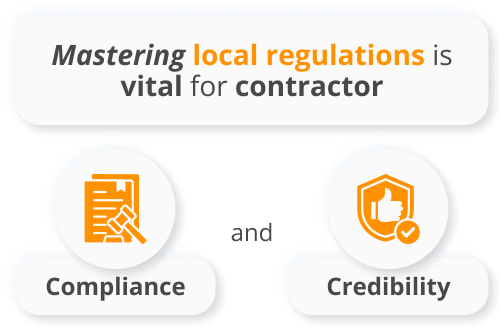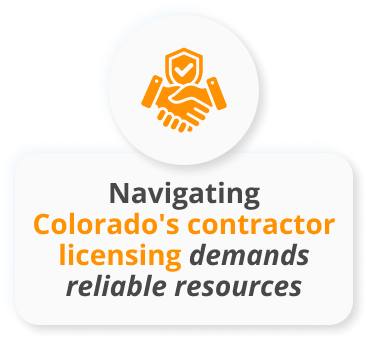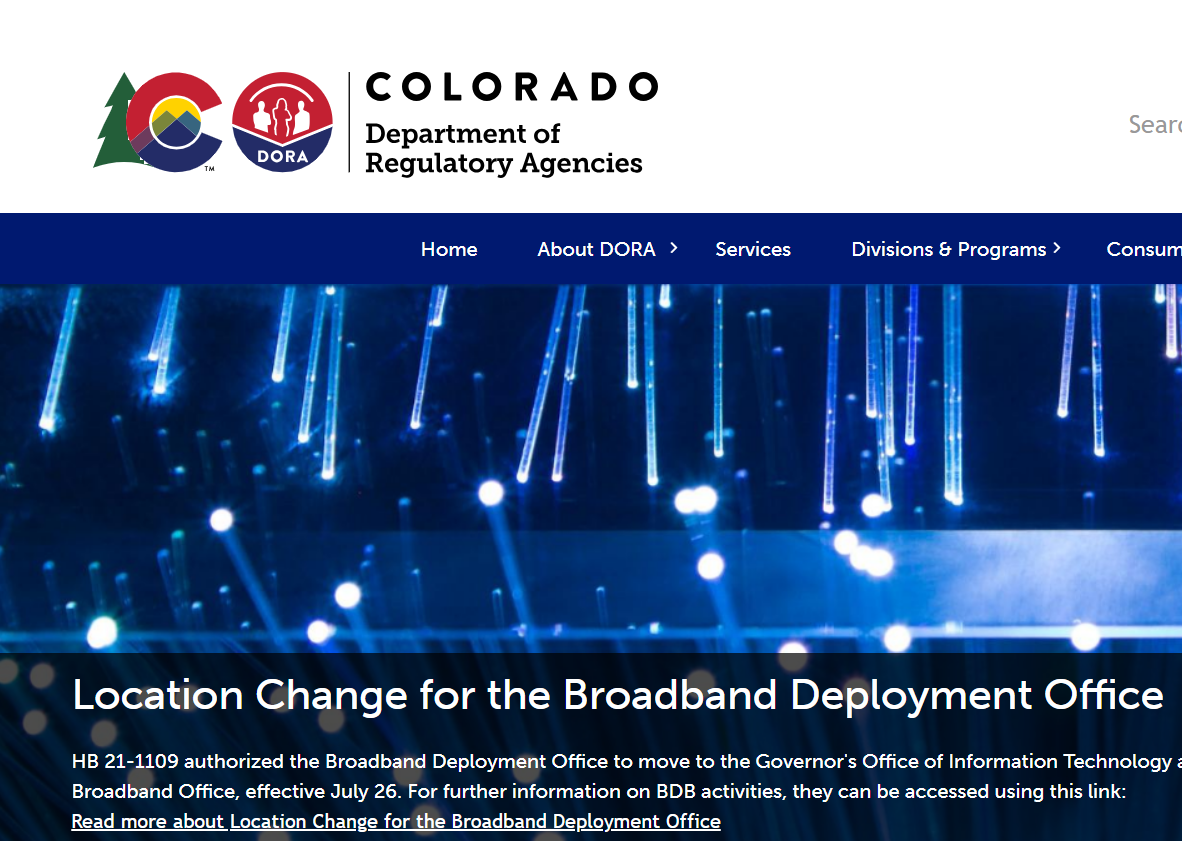Empower Your Craft in Colorado: Stay Informed, Stay Compliant, Stay Ahead! Get Your General Contractor License in Colorado.
Colorado’s construction industry stands as a dynamic and essential sector, significantly contributing to the state’s economic growth and development. With its picturesque landscapes and a booming real estate market, Colorado has become a hub for both residential and commercial construction projects. From the bustling cityscapes of Denver and Colorado Springs to the serene mountain towns, the demand for skilled contractors is ever-present, catering to a diverse range of construction needs.
However, this flourishing industry is underpinned by a crucial aspect that every contractor must navigate: local licensing requirements. Unlike many states, Colorado does not mandate a statewide general contractor license, which places a unique emphasis on the regulations set forth by individual cities and municipalities. This decentralized approach to licensing means that contractors must be well-informed and adaptable, understanding and complying with varying requirements that change from one jurisdiction to another.
Local Licensing Requirements: What You Need to Know
Tips for Contractors on Verifying Local Regulations
Mastering this intricate system is vital for legal compliance and professional credibility. As a contractor, you must take the necessary steps to ensure you follow local regulations. Follow these practical tips to guarantee that you adhere to all the necessary rules and regulations. Get Your General Contractor License in Colorado.

Research Beforehand: Prior to bidding on a project or starting work, contractors should invest time in researching the specific licensing requirements of the municipality where the project is located. This can usually be done through the city or county’s official website.
Contact Local Government Offices: If online information is unclear or unavailable, directly calling the local government’s building or contractor licensing department can provide clarity. It’s wise to document the name of the official you speak with and their advice, in case of future reference.
Utilize Online Resources: Websites like the Colorado Department of Regulatory Agencies and the Colorado Association of Home Builders offer valuable information and links to local regulations. These resources can be a starting point for understanding the broader requirements.
Stay Updated: Regulations can change, so it’s crucial to stay informed about any updates or modifications in licensing requirements. Subscribing to newsletters or joining local contractor associations can be helpful in staying current.
Seek Legal Advice if Necessary: In cases where the regulations are particularly complex or if there’s a risk of non-compliance, consulting with a legal expert who specializes in construction law can be beneficial.
Network with Other Contractors: Sometimes, the best insights come from peers who have navigated the same challenges. Networking with other contractors in the area can provide practical tips and firsthand experiences on dealing with local licensing.
Prepare for Variances in Each Location: Contractors who work in multiple jurisdictions should prepare for and adapt to the different licensing requirements of each. Keeping organized records of each location’s requirements can help streamline this process.
Key Resources for General Contractor Licensing in Colorado
Navigating the diverse landscape of contractor licensing in Colorado requires access to reliable resources. Fortunately, several organizations offer vital support and information to help contractors understand and comply with local regulations. Here’s an overview of some key resources:

Colorado Department of Regulatory Agencies (DORA)
- Role and Offerings:
- Regulatory Authority: DORA serves as a central regulatory body in Colorado, overseeing various professions and businesses, including those in the construction sector.
- Information Hub: It provides comprehensive information on licensing requirements for different types of contractors across the state.
- Guidance on Compliance: DO4RA offers guidelines on how to remain compliant with state laws, helping contractors navigate legal requirements.
- Educational Resources: The department frequently updates its website with educational materials, legal changes, and best practices in the construction industry.
- How Contractors Can Benefit:
- Utilizing DORA as a resource ensures contractors are up-to-date with state-level regulations.
- It’s a primary point of contact for queries related to professional licensing, business practices, and consumer protection.
Colorado Municipal League (CML)
- Role and Offerings:
- Local Government Advocate: CML represents the collective interests of local governments in Colorado and is a valuable resource for understanding municipal-level regulations.
- Resource Library: Their website provides access to a wealth of information relevant to contractors, including local governance, city planning, and municipal laws.
- Networking Opportunities: CML organizes events and conferences that can be excellent opportunities for contractors to network and stay informed about local trends and requirements.
- How Contractors Can Benefit:
- CML offers insights into the workings of local governments, helping contractors tailor their practices to meet specific municipal requirements.
- It’s an excellent platform for contractors to engage with community leaders and peers, fostering relationships that can be beneficial for business growth.
Colorado Association of Home Builders (CAHB)
- Role and Offerings:
- Industry Advocacy: CAHB advocates for the home building industry in Colorado, providing a unified voice on legislative and regulatory issues.
- Support and Resources: They offer resources tailored to home builders, including information on licensing, building codes, and environmental regulations.
- Educational and Networking Events: CAHB hosts educational seminars, workshops, and networking events that are invaluable for professional development and staying informed.
- How Contractors Can Benefit:
- Membership with CAHB can provide contractors with up-to-date information and advocacy support specific to home building.
- The association is a hub for professional development, offering training and certification programs that enhance a contractor’s skills and credibility. Get Your General Contractor License in Colorado.
Steps to Comply with Local Licensing Regulations
Navigating the local licensing regulations in Colorado requires a structured approach. Here is a step-by-step guide for contractors to ensure they find and comply with these requirements effectively:
- Research: Determine the city or municipality where the construction project will take place.
- Contact Local Authorities: If unsure, contact the local building department or government office for clarification.
- Visit Official Websites: Check the official websites of the relevant city or municipality for detailed information on licensing requirements.
- Utilize State Resources: Refer to the Colorado Department of Regulatory Agencies and the Colorado Municipal League for additional guidance and resources.
- Read Carefully: Pay attention to the details of the license types, qualifications needed, examinations, fees, and application processes.
- Seek Clarification: If anything is unclear, contact the local licensing authority or consult with legal experts specializing in construction law.
- Compile Documents: This may include proof of experience, educational credentials, insurance, and financial statements.
- Application Form: Fill out the licensing application form accurately and completely.
- Timely Submission: Ensure the application is submitted before the project’s intended start date to avoid delays.
- Follow Up: Keep track of the application’s status and be proactive in addressing any queries from the licensing authority.
- Examinations: If required, prepare and sit for any relevant examinations.
- Insurance and Bonding: Obtain necessary insurance and bonding as per the local requirements.
- Renewal: Be aware of the renewal cycle for your license and renew it on time.
- Continuing Education: Engage in any required continuing education to stay informed and maintain your license.
- Compliance: Ensure all construction work complies with local building codes and safety regulations.
- Inspections: Be prepared for and cooperate with any required inspections by local authorities. Get Your General Contractor License in Colorado.
Frequently Asked Questions (FAQ)
These are common questions about General Contractor License in Colorado.
Colorado delegates the responsibility of licensing contractors to local governments, allowing for regulations that cater to the specific needs and standards of each city and municipality.
You can visit the official website of your local city or municipality, consult the Colorado Department of Regulatory Agencies, or contact the local government offices directly for the most accurate and up-to-date information.
Penalties for non-compliance can include fines, legal action, and a stoppage of work. It can also negatively impact your professional reputation and future business opportunities.
Yes, the Colorado Department of Regulatory Agencies, Colorado Municipal League, and Colorado Association of Home Builders are excellent resources. They provide updates, educational materials, and networking opportunities.
Yes, license renewal is necessary, and the frequency varies based on the local jurisdiction’s regulations. Contractors should check with the local licensing authority for specific renewal requirements.



